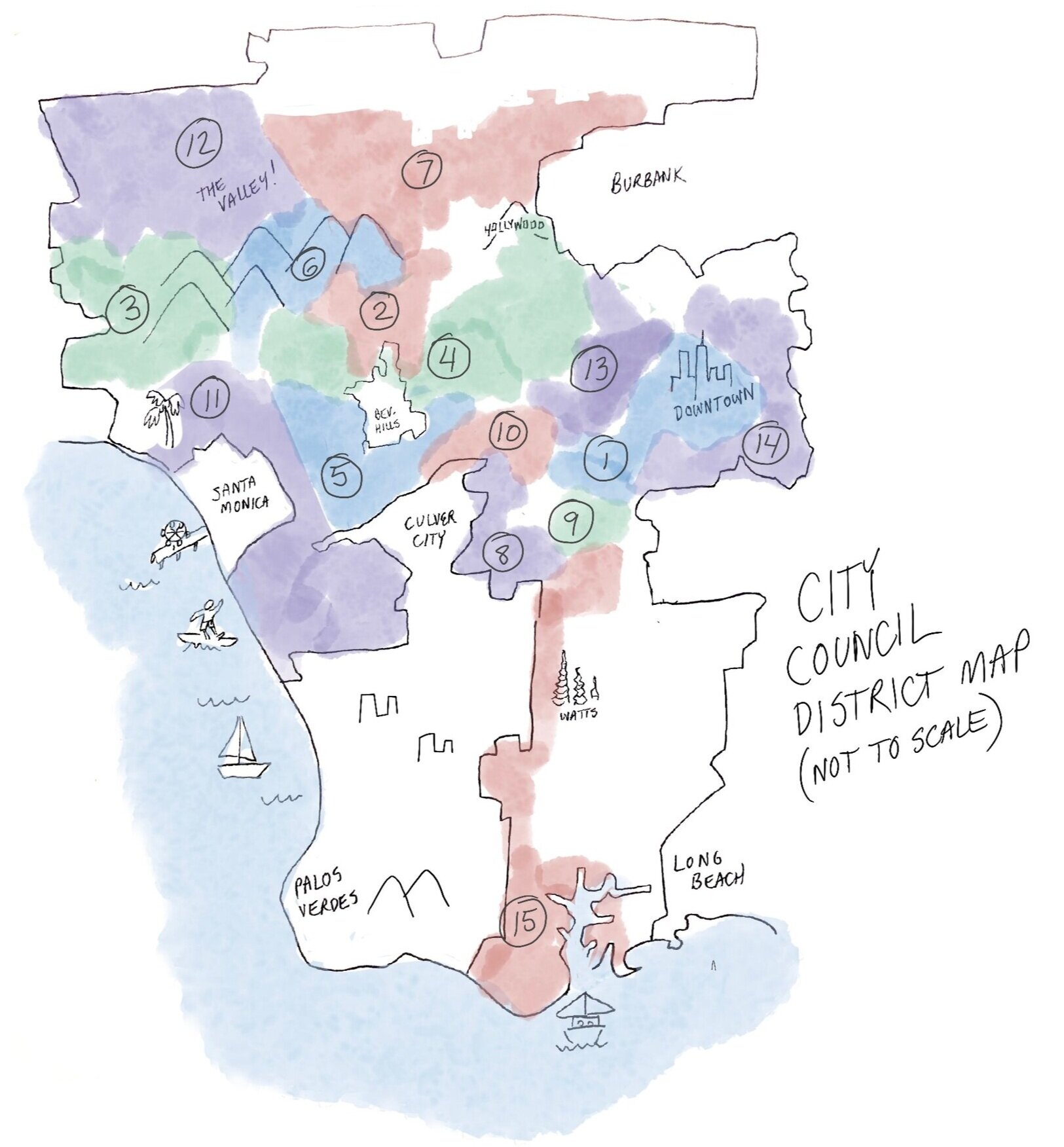LA City Overview
The City of LA is the second biggest municipality in the country, with a population of more than 4 million. It operates massive police and fire departments, libraries, public works, parks, sanitation disposal, street services and more in addition to housing and planning departments.
The City also has control over all water and electricity provision within its borders through its publicly owned utility, the LA Department of Water and Power (with its own budget of $6.1 billion), the Port of LA (through which $297 billion in cargo passed in 2018), and LAX airport (serving 88 million people annually).
Power in the City of Los Angeles’ government is far more fragmented than at the County. The two main power centers are the City Council’s 15 members who constitute the legislative branch of government and the Mayor, who runs the executive branch and the many different departments and agencies that are part of the City. There’s also a powerful elected City Attorney, a not-so-powerful elected City Controller, and several officials appointed directly by the Mayor and/or Council who wield a lot of influence across the City Government.
Council Districts & the City of Los Angeles
The City of LA is divided up into 15 council districts composed of multiple neighborhoods and each containing approximately 260,000 residents. Each council district is represented by an elected official called a Council Member, who votes on proposed laws and budgets for the entire city, and has informal power over development, transportation, many other types of city services and projects in their own district.
Elected Officials in the City of LA
Elected officials are voted in office by the general public, and they play a prominent role in shaping the politics of the City of Los Angeles. The four prominent elected official positions are the Mayor, City Councilmembers, City Attorney, and City Controller.
Mayor
The Mayor oversees the 15 City Council Districts that together make up the City of Los Angeles. The Mayor is the chief executive for the city with veto and emergency powers. She also has tremendous power in appointing people to key positions - such as the Chief of Police and the manager for LA Department of Water and Power (LADWP) - directly and via the commissioners she appoints to oversee Departments. She also influences the annual budget, oversee the enforcement of city ordinances, and through his appointees, manages all city departments and agencies.
City Council
The LA City Council is responsible for enacting laws that govern the City of Los Angeles and has final say on the budget for all departments and agencies within the City. In total, there are 15 City Council Members who each represent a council district. Council Members maintain tremendous power and influence over their respective districts.
City Attorney
The City Attorney and her office have a wide variety of responsibilities ranging from writing municipal laws for the city to advising the Mayor, City Council members, and various city departments and commissions on legal matters. Other tasks for the department include examining contracts and ordinances and interpreting the City Charter. The City Attorney has a great deal of influence as the City’s general counsel including the power to bring lawsuits forward and prosecute misdemeanor crimes on behalf of the city.
City Controller
The City Controller is the chief accounting officer, auditor and paymaster for the City of Los Angeles. One of the Controller’s main functions is to analyze the effectiveness of different city departments. The current Controller oversees 3 divisions: Audit Services, Accounting Operations, and Financial Reporting along with 160 employees who conduct independent audits.
Appointed Officials in the City of Los Angeles
There are many appointed officials in the City who are handpicked by either the Mayor or City Council and affect everyday life for Angelenos. Below we’re highlighting four especially important officials.
Chief Legislative Analyst
The Chief Legislative Analyst plays a prominent role helping the City Council develop the city’s legislative programs, analyze budgets on behalf of the council, and provide research on legislative matters.
Chief Administrative Officer (CAO)
The CAO helps the Mayor prepare annual city budgets and helps the council analyze the City budget. The CAO also helps evaluate and control financial risk, conduct management reviews, evaluate City departments, and help administer disaster grants.
City Treasurer
As part of the Office of Finance, the City Treasurer stewards the City of Los Angeles’s funds and investments. This includes managing the City’s $8 billion General and Special Pool investment portfolio, and cash and debt programs exceeding $50 billion.
City Clerk
The City Clerk office has four major divisions of work:
(1) Council and Public Services Division. (2) Record Management Division. (3) Election Division. (4) Land Records Division.
City Government Departments
The City of Los Angeles has dozens of departments and agencies. Some of them are governed directly by commissions, others governed by paid staff but supervised by commissions, and still more have no commissions over them at all. Commissioners are appointed by the Mayor and/or City Councilmembers. Multiple departments are responsible for an issue you care about.







